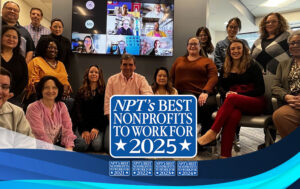Habitat for Humanity of Washington, D.C. | April 4, 2017
How DC Habitat is Empowering Families to Thrive through Stability, Equity, and Self-Reliance
 Washington, D.C. is in the midst of a serious affordable housing shortage. The Department of Housing and Urban Development (HUD) considers housing to be affordable if a person spends no more than 30% of his or her income towards rent or a mortgage. In D.C., one in four residents spends more than half of their income on housing leaving precious little for basic necessities like food, transportation, and medical care. Low-income families can’t save for the future. They are unable to weather financial shocks and risk being plunged into poverty by events that middle class families handle with ease.
Washington, D.C. is in the midst of a serious affordable housing shortage. The Department of Housing and Urban Development (HUD) considers housing to be affordable if a person spends no more than 30% of his or her income towards rent or a mortgage. In D.C., one in four residents spends more than half of their income on housing leaving precious little for basic necessities like food, transportation, and medical care. Low-income families can’t save for the future. They are unable to weather financial shocks and risk being plunged into poverty by events that middle class families handle with ease.
Habitat for Humanity of Washington, D.C. is working to address this problem by providing affordable homeownership opportunities for families who live in cramped, unaffordable, and substandard housing. We don’t give homes away; we provide a hand up to empower families to build their own stable futures. In fact Habitat homebuyers partner with us for every step of the process. Our families complete 200-300 sweat equity hours helping to build their home or their neighbors’ homes alongside our volunteers. They also make a small down payment and affordable monthly mortgage payments on their home. By making homeownership affordable, we help families to build stability, equity, and self-reliance so they can stop just getting by and begin to thrive.
Empowering Families: Providing a Hand Up Instead of a Hand Out
Take Andrea Morgan for example. Andrea grew up in a small, one-bedroom home with five siblings in Southeast D.C. As an adult, life was no easier. Andrea is a single mother of three children and one grandchild, and two of her children have disabilities. Her youngest was adopted by Andrea when a friend who was no longer able to care for the child designated Andrea as the guardian.
Despite her challenges, Andrea has always worked to provide a good life for her family, working as a Health Information Assistant since 2002. However, living in a tiny, two-bedroom apartment with a growing family and her kids’ special needs proved unmanageable for her family. Andrea’s son has a chronic illness that has led him to undergo many surgeries and use a wheelchair or walker to move around.
Not only was their old apartment inaccessible for wheelchair use, but medical supplies—like the wheelchair, multiple oxygen tanks, and feeding tubes—simply did not fit within the limited space.
Andrea had been searching for a home that was more accessible for her son. Despite moving into a new unit, Andrea continued to struggle with both accessibility issues and burdensome rent. Andrea had been on the waiting lists for the Housing Choice Voucher Program, accessible unit programs, and affordable housing programs, but was still not able to find a new home that met her family’s needs.
“I had to show my kids what a fighter really looked like,” said Andrea. “I had to be the one to hold on for them.”
It was in 2004 that Andrea first learned about Habitat. More than 10 years later, she reached out again and after completing the application process, was accepted into DC Habitat’s program. Andrea worked diligently to complete her sweat equity, and because she didn’t qualify for D.C.’s first-time homebuyer down payment assistance program, HPAP, she had to work hard to raise funds for her down payment.
With an affordable mortgage payment that will let her build equity, Andrea can now save money for her son’s medical treatments, schooling, and their future. These savings are especially important for Andrea as two of her children will remain permanent dependents into adulthood. Her family doesn’t have to worry about being forced out due to medical reasons. They have a safe, decent home that will meet her family’s needs for years to come.
Companies and Their Employees are Critical to Habitat DC’s Success
Community support is critical to our work and donations from individuals and companies help us to continue to build and serve local families. Because of the high cost of land and housing in D.C., we sell our homes at a loss and have to raise $100,000 for each home that we build, but every little bit can make a difference. The donations we receive from individuals help us to cover the cost of things like windows ($100 each), a kitchen sink ($150), or flooring ($1,000). We also partner with companies who help to sponsor our homes and volunteer on our build sites—some even sponsor entire houses! When you support Habitat through a one-time donation, monthly gifts, workplace giving, or sponsorship, you’re making a permanent difference in the life of a local family. Homeownership is one of the most effective pathways to the middle class and you can empower a family to build their own brighter more secure future.
For more information about DC Habitat and ways to get involved, visit our website: www.dchabitat.org.
Support Habitat DC’s work through a well-designed corporate philanthropy program:
As DC Habitat’s workplace giving partner, America’s Charities can help your company design and implement a program centered on supporting their work – through workplace giving campaigns, employee fundraising, cause-focused signature programs, volunteerism, Dollars-for-Doers, In-Kind Giving and other employee engagement and philanthropic initiatives. Click here to request a demo and learn how we can help you do this.
Below is an example donation campaign your company could hold in support of DC Habitat using America’s Charities powered by Causecast solution:
Get Resources and Insights Straight To Your Inbox
Explore More Articles
Data Processor & Customer Service Representative, Charitable Funds Management Solutions
Reporting Structure: Director, CFMS Term: October 2025 to February 2026 Schedule: Full-Time; Monday-Friday up to 37.5 hours per week. Rate: $20 per hour Overview of…
Read ArticleCustomer Support Agent (Remote – Part Time)
Department: Charitable Funds Management Solutions We are a nonprofit charitable organization looking for skilled individuals who can coordinate multiple client requirements related to fund processing and…
Read ArticleGet Resources and Insights Straight To Your Inbox
Receive our monthly/bi-monthly newsletter filled with information about causes, nonprofit impact, and topics important for corporate social responsibility and employee engagement professionals, including disaster response, workplace giving, matching gifts, employee assistance funds, volunteering, scholarship award program management, grantmaking, and other philanthropic initiatives.




